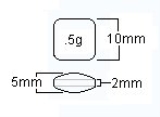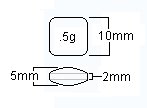
Dentyne Mints
Encyclopedia
| Dentyne Mints | |
 |
|
| Formal name | Dentyne Ice Mints, Dentyne Fire Mints |
| Classification | Breath mint |
| Description | Breath mint |
| Form | Square pillow |
| Displacement | 450mm3 (approx.) |
| Mass | .5 grams (approx.) |
| Ingredients | Sorbitol Sorbitol Sorbitol, also known as glucitol, Sorbogem® and Sorbo®, is a sugar alcohol that the human body metabolizes slowly. It can be obtained by reduction of glucose, changing the aldehyde group to a hydroxyl group. Sorbitol is found in apples, pears, peaches, and prunes... , flavoring, aspartame Aspartame Aspartame is an artificial, non-saccharide sweetener used as a sugar substitute in some foods and beverages. In the European Union, it is codified as E951. Aspartame is a methyl ester of the aspartic acid/phenylalanine dipeptide. It was first sold under the brand name NutraSweet; since 2009 it... , magnesium stearate Magnesium stearate Magnesium stearate, also called octadecanoic acid, magnesium salt, is a white substance which is solid at room temperature. It has the chemical formula . It is a salt containing two equivalents of stearate and one magnesium cation... , sucralose Sucralose Sucralose is an artificial sweetener. The majority of ingested sucralose is not broken down by the body and therefore it is non-caloric. In the European Union, it is also known under the E number E955. Sucralose is approximately 600 times as sweet as sucrose , twice as sweet as saccharin, and 3.3... , soy lecithin, food coloring Food coloring Food coloring is a substance, liquid or powder, that is added to food or drink to change its color. Food coloring is used both in commercial food production and in domestic cooking... (Dentyne Fire Mints only) Sorbitol, gum base Gum base Gum base is the non-nutritive, non-digestible, water-insoluble masticatory delivery system used to carry sweeteners, flavors and any other desired substances in chewing gum and bubble gum. It provides all the basic textural and masticatory properties of gum.... , maltitol Maltitol Maltitol is a sugar alcohol used as a sugar substitute. It has 75-90% of the sweetness of sucrose and nearly identical properties, except for browning. It is used to replace table sugar because it has fewer calories, does not promote tooth decay, and has a somewhat lesser effect on blood glucose... , mannitol Mannitol Mannitol is a white, crystalline organic compound with the formula . This polyol is used as an osmotic diuretic agent and a weak renal vasodilator... , flavoring, glycerin, acesulfame potassium Acesulfame potassium Acesulfame potassium is a calorie-free artificial sweetener, also known as Acesulfame K or Ace K , and marketed under the trade names Sunett and Sweet One. In the European Union, it is known under the E number E950... , aspartame, BHT Butylated hydroxytoluene Butylated hydroxytoluene , also known as butylhydroxytoluene, is a lipophilic organic compound that is primarily used as an antioxidant food additive as well as an antioxidant additive in cosmetics, pharmaceuticals, jet fuels, rubber, petroleum products, electrical transformer oil, and embalming... , candelilla wax Candelilla wax Candelilla wax is a wax derived from the leaves of the small Candelilla shrub native to northern Mexico and the southwestern United States, Euphorbia cerifera and Euphorbia antisyphilitica, from the family Euphorbiaceae... , soy lecithin, sucralose, titanium dioxide Titanium dioxide Titanium dioxide, also known as titanium oxide or titania, is the naturally occurring oxide of titanium, chemical formula . When used as a pigment, it is called titanium white, Pigment White 6, or CI 77891. Generally it comes in two different forms, rutile and anatase. It has a wide range of... (Color) (Dentyne Ice Mints only) |
| Nutrition Information | Per mint: calories 5, fat Fat Fats consist of a wide group of compounds that are generally soluble in organic solvents and generally insoluble in water. Chemically, fats are triglycerides, triesters of glycerol and any of several fatty acids. Fats may be either solid or liquid at room temperature, depending on their structure... 0g, sodium Sodium Sodium is a chemical element with the symbol Na and atomic number 11. It is a soft, silvery-white, highly reactive metal and is a member of the alkali metals; its only stable isotope is 23Na. It is an abundant element that exists in numerous minerals, most commonly as sodium chloride... 0g, carbohydrates <0.5g, sugars 0g, sugar alcohol Sugar alcohol A sugar alcohol is a hydrogenated form of carbohydrate, whose carbonyl group has been reduced to a primary or secondary hydroxyl group . Sugar alcohols have the general formula Hn+1H, whereas sugars have HnHCO... <0.5g, protein Protein Proteins are biochemical compounds consisting of one or more polypeptides typically folded into a globular or fibrous form, facilitating a biological function. A polypeptide is a single linear polymer chain of amino acids bonded together by peptide bonds between the carboxyl and amino groups of... 0g. |
| Active Ingredients | None. |
| Flavors | Ice (mint), Fire (cinnamon Cinnamon Cinnamon is a spice obtained from the inner bark of several trees from the genus Cinnamomum that is used in both sweet and savoury foods... ) |
| Sugar Free? | Yes |
| Manufacturer | Cadbury Adams |
| Year introduced | 200? |
| Slogans / Taglines | Happy hunting |
| Related products | Dentyne Dentyne Dentyne is a series of brands of chewing gum available in several countries globally. It is owned by Cadbury Adams, a division of Cadbury.In 1899, a New York City druggist named Franklin V. Canning formulated a chewing gum which he promoted as an aid to oral hygiene. "To prevent decay, To sweeten... Ice gum and Dentyne Fire gum |
| Hazards | Food coloring (Dentyne Fire Mints only), Phenylalanine |
Dentyne mints are a brand of breath mint manufactured by Cadbury Adams, a division of Cadbury-Schweppes.
Description
The mints are produced in two flavors: Ice (mint flavored) and Fire (cinnamon flavored). The form is a white (Dentyne Ice Mints) or red (Dentyne Fire Mints) pillow shape (slightly rounded square with rounded top and bottom). The mints are plain, with no printing or embossing.Dentyne Mints are packed in a plastic box in the form of a rectangular solid with corners slightly rounded (along the X and Y axes only). Along the top of the top is a square hole with a sliding cover. Sliding this cover away from the hole allows access to the mints. The box uses no hinges.
50 mints are contained in each package.
Dentyne mints are not true mints, as they contain no mint oil.
Nomenclature
The classification of Dentyne Fire as a "mint" can be questioned, as they contain (natural and artificial) cinnamon flavor, rather than mint flavor. Cadbury Adams, however, identifies both Dentyne Ice and Dentyne Fire as "mints".Dentyne gum
Dentyne Mints should not be confused with Dentyne gumDentyne
Dentyne is a series of brands of chewing gum available in several countries globally. It is owned by Cadbury Adams, a division of Cadbury.In 1899, a New York City druggist named Franklin V. Canning formulated a chewing gum which he promoted as an aid to oral hygiene. "To prevent decay, To sweeten...
, which is also made in Ice and Fire flavors, is sold in packaging similar to Dentyne Mints, and has a generally similar form.

